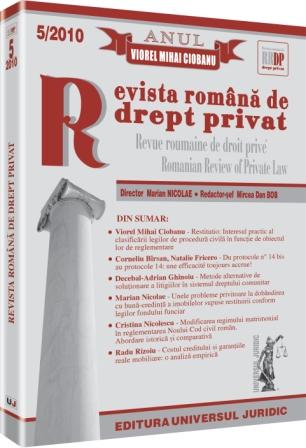Consideratii privind reprezentarea în noul cod civil român
Approaches on representation in the new romanian civil code
Author(s): Dan-Alexandru SitaruSubject(s): Law, Constitution, Jurisprudence
Published by: Universul Juridic
Keywords: New Civil Code; representation; mandate
Summary/Abstract: Representation is an apparent exception to the principle of relativity of instruments’ effects. The Romanian Civil Code and Commercial Code, both still effective, do not include general provisions on the institution of representation. This legislative gap is covered by the new Civil Code, which deals with the institution of representation in articles 1295-1314. New Civil Code provisions are covered by the analysis hereby. The New Civil Code does not contain a proper definition of representation. Taking our stand upon the characteristics of the institution of representation as it is regulated in the new civil legislation, but also upon the doctrine of specialty consecrated to this institution before the issue of the New Civil Code, we hereby define representation as the technical legal process whereby an individual, appointed representative, performs acts in law for and on behalf of another individual, appointed represented party, the effects of the instrument concluded as such following to occur directly and immediately on the represented party. Representation can be classified according to several criteria. Thus, according to art. 1295 in the New Civil Code, in terms of its source, the representation may be legal, conventional or judicial. In terms of the scope of powers conferred on the representative, the representation may be general (total) or special (partial). Traditionally, the Romanian civil law treats representation as the basis of the contract of mandate, but is not identical with it. Thus, the contract of mandate may be accompanied by the powers of representation, in which case we deal with a representation mandate or a mandate itself. For this legal case, the doctrine uses also the terms of direct or perfect representation. On the other hand, one mandate may not be accompanied by the power of representation (mandate without representation), which is expressed essentially under the commission agreement. Doctrine used for this type of contract the concept of indirect or imperfect representation. The new Civil Code legislates as determining classification of mandate in mandate with representation and mandate without representation in art. 2011, dedicated to types of mandate, generally. This vision of the legislator is evidenced in the fact that, under the heading of this type of contract (art. 2009-2071), one may distinguish the representation mandate (art. 2013-2038) and the mandate without representation (art. 2039-2071), the latter category including the commission, consignment and transport agreements. The concepts of representation mandate and mandate without representation are patient of two meanings, depending on the following criteria: a) as the agent acts for and on behalf of the principal or acts for himself and on behalf of the mandator (principal), b) as the agent is empowered solely to negotiate with the third party, but without performing acts in law with the latter, or the agent is e
Journal: Revista Română de Drept Privat
- Issue Year: 2010
- Issue No: 05
- Page Range: 137-169
- Page Count: 33
- Language: Romanian
- Content File-PDF

